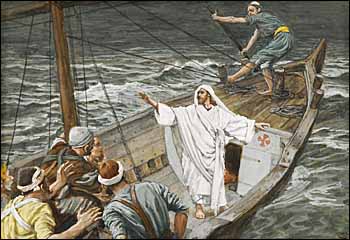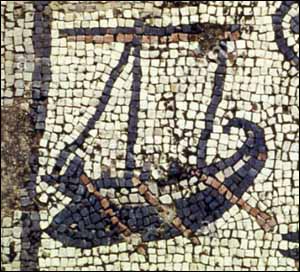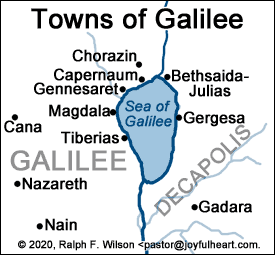
|
Old Testament
New Testament
Gospels
Acts
Paul's Letters
General Letters
Revelation
Topical Studies
Beginning the Journey (for new Christians). en Español

|
Old Testament
New Testament
Gospels
Acts
Paul's Letters
General Letters
Revelation
Topical Studies

|
Home
Bible Studies
Articles
Books
Podcasts
Search
Menu
Donate
About Us
Contact Us
FAQ
Sitemap
30. Calming the Storm (Luke 8:22-25)

James J. Tissot, 'Jesus Stilling the Tempest' (1886-94), gouache on gray wove paper,
5 x 7.25 in., Brooklyn Museum, New York.
"22 One day Jesus said to his disciples, 'Let's go over to the other side of the lake.' So they got into a boat and set out. 23 As they sailed, he fell asleep. A squall came down on the lake, so that the boat was being swamped, and they were in great danger. 24 The disciples went and woke him, saying, 'Master, Master, we're going to drown!' He got up and rebuked the wind and the raging waters; the storm subsided, and all was calm. 25 'Where is your faith?' he asked his disciples. In fear and amazement they asked one another, 'Who is this? He commands even the winds and the water, and they obey him.'" (Luke 8:22-25, NIV)
I have rowed rowboats and paddled canoes. I even attempted to water-ski once. But I had never tried my hand at sailing. It looks so effortless when watching the white sails on a lake or bay. The Sierra camp where we vacationed had several short plastic-hull sailboats, and I was determined to have a go at it. I must award my wife a ribbon for bravery, because she volunteered to go with me. The good news is that we didn't tip over -- quite. The bad news is that only pure luck got us back to the dock.
It was kind of heady, though. The wind on the lake is unpredictable and unstable. Sometimes we were becalmed, but then a breeze would come up, catch the sail, and, if the sail was at the right angle to the wind, we would catch it, the boat would lean precipitously, and we would begin to skim over the waters, leaning as far as possible to the far side to keep from capsizing. The exercise was useful to get an adrenaline rush if that's what I was after, but not for a relaxing afternoon. I was half-way between terror and exhilaration, as long as we were out.
My great sailing adventure, however, taught me something very important about boats. If you are going to have a big sail, you'd better have a deep keel to keep the boat from heeling over. Without a keel you'd have to be awfully careful and be ready to shift positions in the boat very quickly, if you had your full sail rigged.
Boats in first century Galilee (Luke 8:22)
 Mosaic of boat with sail raised found at Migdal (Magdala), now on display at Capernaum. |
The fishing boats on Galilee in Jesus' day didn't have keels. They were relatively flat-bottomed so they could be easily pulled up on the beach to unload and used in the shallows along the shore. If a first century fishing boat recovered in 1986 near Migdal at the northern end of the Sea of Galilee is any indication, stability would come primarily from the breadth of boat, not from any keel. (See more on the "Jesus Boat" in lesson 10.) And a mosaic also found at Migdal (or "Magdala," now on display at Capernaum) shows a boat with a large sail raised.
Squalls on Galilee (Luke 8:23b)
To this sailboat-shy landlubber, a big sail without a keel is a disaster waiting to happen, if the fishermen were taken by surprise. Apparently, that is what happened this late afternoon as the disciple's boat carried Jesus and his disciples across the lake to the eastern shore and the deserted area of the Garasenes.
 Sea of Galilee (larger map) |
The Sea of Galilee is a relatively small body of water about thirteen miles (21 km.) long North to South, seven miles (13 km.) across at its widest, and 165 feet at its deepest. It lies in the Jordan Rift Valley, at 696 feet (212 m.) below sea level, surrounded by hills on the East and West that rise to more than 1,000 feet. To the South, the Jordan River flows out of the Sea of Galilee to the Dead Sea. To the North is the narrow Hula Valley that leads to the headwaters of the Jordan lying on the slopes of the majestic Mount Hermon. Hermon, with its peak at 9,232 feet (2813 m.), dominates the landscape.
At lake level, the climate is semitropical with temperatures commonly above 100o F. (40 o C.). When cool air from the uplands sweeps down the gorges and upon the surface of the water, sudden and violent storms can occur.259 Dr. W.M. Christie, who spent many years in Galilee, says that during these storms the winds seem to blow from all directions at the same time, for they rush down the narrow gorges in the hills and strike the water at an angle. He relates one rather vivid incident:
"A company of visitors was standing on the shore at Tiberias, and, noting the glassy surface of the water and the smallness of the lake, they expressed doubts as to the possibility of such storms as those described in the gospels. Almost immediately the wind sprang up. In twenty minutes the sea was white with foam-crested waves. Great billows broke over the towers at the corners of the city walls, and the visitors were compelled to seek shelter from the blinding spray, though now two hundred yards from the lakeside."
In less than half an hour the placid sunshine had become a raging storm.260
Drawing upon my "extensive" experience sailing I can well imagine a gust of wind in the full sail that tips the boat just once so that water pours in over the gunwales and begins to swamp the boat. Immediately, the experienced fishermen manning the boat shift their positions to right the boat, but it is too late. Now the boat is riding low, partly filled with sloshing water, and the waves are starting to come up. A wave or two breaking over them will fill the boat completely, and it will sink there in the middle of the lake, with only the strongest swimmers having a chance to make it to shore. Fear grips them in the stomach, as the storm is increasing in strength. Luke's words are terse: "A squall came down on the lake, so that the boat was being swamped, and they were in great danger."
Jesus Sleeping (Luke 8:23a)
Jesus is exhausted from the day's teaching, which included, in both Mark's and Luke's sequence, the Parable of the Sower and probably others. "Let's go across to the other side of the lake," he tells his disciples. And so they get into "the boat," as Mark puts it, the boat they were accustomed to using during Jesus' Galilean ministry, perhaps Peter's. Mark also mentions, "And there were other boats with them" (Mark 4:36).
Jesus takes his place in the stern, and is soon asleep on the cushion there (Mark 4:38). It is so difficult for us to visualize the Son of God as a man, but this scene helps us. The utterly exhausted teacher, who has been giving out day after day, is so tired that he is able to sleep through the rising storm.
Fearful Prayers (Luke 8:24a)
In their panic, the disciples go to Jesus and wake him with alarm. I can see one of them shaking his shoulder. "Master, master, we're going to drown!" The word translated "going to drown" is the present tense of Greek apollumi, (middle voice) "be destroyed, ruined, perish, die."261 The present tense has the sense of present continuing action: It is happening! It is upon us! Utter panic.
In Mark's account there is an implied blame, "Teacher, don't you care if we drown?" That sounds pretty believable. It sounds kind of like our petty blaming of God for allowing various circumstances to enter our life and threaten the status quo. "Don't you care?"
Rebuking the Wind (Luke 8:24b)
"He got up and rebuked the wind and the raging waters; the storm subsided, and all was calm" (8:24b). The word translated "rebuked" is Greek epitimaō, "rebuke, reprove, censure."262 The word is used to correct Jesus' disciples (Luke 9:55; 19:39-40), to silence demons (Mark 3:12), to cast out unclean spirits (Mark 9:25), to command a fever to cease (Luke 4:39).
According to Mark's Gospel, Jesus' words to the storm were, "Quiet! Be still!" (Mark 4:39). The Greek words are siōpaō, "keep silent, say nothing, make no sound, stop speaking, be or become quiet,"263 and phimoō, "tie shut," specifically, "muzzle." Figuratively "(put to) silence."264
Luke records, "the storm subsided, and all was calm." The Greek Aorist tense used here indicates that the storm and waves ceased rather quickly, there wasn't a gradual ceasing (as the Imperfect might imply). A great calm settled over the surface of the sea. The Greek word is galēnē, "a calm" on the lake.265
Where Is Your Faith? (Luke 8:25a)
But after rebuking the storm, Jesus also rebukes his disciples with the question, "Where is your faith?" They had seen him heal the sick and cast out demons. But when they returned to the dangers of the environment where they conducted their livelihood, the waters of this inland lake, they seemed to suddenly forget Jesus' power, and who he seemed to be. Instead, they wake him in panic and ask him if he even cares what is happening to them. How easily we compartmentalize our lives, one compartment for church and Christianity, another for our family, and a third for our work. And to keep our vessel from sinking, there is a watertight door that separates each compartment from each other compartment. Sometimes, our Christianity is hardly able to pass into that sphere where we struggle and sweat and are sometimes overwhelmed and near to capsizing. Jesus' question, "Where is your faith?" might be just as well directed towards us.
Even the Winds and Water Obey Him (Luke 8:25b)
"In fear and amazement they asked one another, 'Who is this? He commands even the winds and the water, and they obey him.'" (8:25b)
The surface of the sea is calm, glassy. And though the disciples know that Jesus is disappointed with them, with their lack of faith in him, that isn't what consumes their thoughts. Rather, it is the question: "Who can this be, who has authority even over the powers of nature?"
I think for the disciples, the Stilling of the Storm was one of those, excuse the expression, "watershed" experiences. Before this they had seen Jesus as a teacher and miracle worker. One they loved, one who brought them the words of life, one who promised nearness of the Kingdom of God. Perhaps he was the messiah, though they had scarcely dared to think that as yet.
But now they saw him as transcending the realm of a man, even a spiritual man. Now they saw him as doing what only God can do. This miracle can only be compared to something on the scale of Moses parting the Red Sea or God bringing manna. They were stunned. If you had been there, you would have been stunned. Even Peter had no words.
In the Same Boat
I want to go back for a moment to Jesus' mild rebuke to the disciples: "Where is your faith?" The obvious response to Jesus' question is another question, "Faith in what?" Why should we have faith in panic situations? The answer, obviously, is the faith that the ship will not -- cannot -- go down with the Son of God on board. For asleep on the cushion in the same boat with them was God's only begotten Son. The lesson for us is that when Jesus is in the same boat, we cannot sink, even though the storms around us are fierce and we start to take on water. Consider some of the promises of the Word to us:
"I will never leave you or forsake you." (Hebrews 13:5)
"I am with you and will watch over you wherever you go." (Genesis 28:15)
"Be strong and courageous. Do not be afraid or terrified because of them, for the Lord your God goes with you; he will never leave you nor forsake you." (Deuteronomy 31:6)
"As I was with Moses, so I will be with you; I will never leave you nor forsake you." (Joshua 1:5)
"David also said to Solomon his son, 'Be strong and courageous, and do the work. Do not be afraid or discouraged, for the Lord God, my God, is with you. He will not fail you or forsake you until all the work for the service of the temple of the Lord is finished.'" (1 Chronicles 28:20)
"So do not fear, for I am with you;
do not be dismayed, for I am your God.
I will strengthen you and help you;
I will uphold you with my righteous right hand." (Isaiah 41:10)
"When you pass through the waters,
I will be with you;
and when you pass through the rivers,
they will not sweep over you.
When you walk through the fire,
you will not be burned;
the flames will not set you ablaze." (Isaiah 43:2)
"For the pagans run after all these things, and your heavenly Father knows that you need them. But seek first his kingdom and his righteousness, and all these things will be given to you as well." (Matthew 6:32-33)
"I know what it is to be in need, and I know what it is to have plenty. I have learned the secret of being content in any and every situation, whether well fed or hungry, whether living in plenty or in want. I can do everything through him who gives me strength." (Philippians 4:12-13)
"And surely I am with you always, to the very end of the age." (Matthew 28:20)
"What wonderful promises that invite us to partake of the divine nature!" (2 Peter 1:4)
My dear friend, I know what fear is. You know what terrors haunt you. But the marvelous truth contained in this story is designed to calm those fears and give you peace inside. Jesus invites your spirit to relax. He is with you. He will handle the events that are raging beyond your control. He is in the same boat as you. And he loves you.
Where has your faith in Jesus been? Where did you drop it along the way? Pick it up now -- this trust that Jesus is with you and will be with you though everything.
"And the peace of God, which transcends all
understanding,
will guard your hearts and your minds in Christ Jesus." (Philippians
4:7)ScriptureQuotation
Prayer
Father, I know what it is like to be gripped with fear, not just for a moment of time, but for weeks on end. That is no way for a Christian to live. Thank you for strengthening my faith, and the faith of my brothers and sisters. Thank you for sending Jesus to bring us to yourself. Thank you for sending the Holy Spirit to dwell with us and in us. Thank you that not a sparrow falls to the ground without you knowing it. Thank you for the comfort of your presence.
I need to internalize this important disciple lesson of trust even in the midst of great danger. Please forgive me for my unbelief. Please teach me, and strengthen me so that my faith will appropriately reflect your greatness. Thank you for your great patience with me. In Jesus' name, I pray. Amen.
Key Verses
"'Where is your faith?' he asked his disciples." (Luke 8:25a)
"Who is this? He commands even the winds and the water, and they obey him." (Luke 8:25b)
Questions
Click on the link below to discuss on the forum one or more of the questions
that follow -- your choice.
https://www.joyfulheart.com/forums/topic/1945-30-storm/
I expect that even decades after this event, the disciples could remember the storm with vivid clarity.
- What was the most important lesson that you think Jesus intended his disciples to learn from this?
- What is the second most important lesson that they were to learn?
- What does it take to banish the fear that we sometimes feel?
- How much of the substance of our faith is self-talk and convincing ourselves that something is true? How do we gain the kind of solid faith that doesn't consist in self-convincing?
 Lessons compiled in 805-page book in paperback, Kindle, & PDF. |
Endnotes
[259] W.W. Buehler, "Sea of Galilee," ISBE 2:391-392.
[260] Quoted in William Barclay, Gospel of Matthew (The Daily Study Bible; Second Edition; St. Andrew Press, 1958), vol.1, p. 323
[261] Apollymi, BAGD 95.
[262] Epitimaō, BAGD 303.
[263] Siōpaō, BAGD 752.
[264] Phimoō, BAGD 861-862.
[265] Galēnē, BAGD 150.
Copyright © 2025, Ralph F. Wilson. <pastor![]() joyfulheart.com> All rights reserved. A single copy of this article is free. Do not put this on a website. See legal, copyright, and reprint information.
joyfulheart.com> All rights reserved. A single copy of this article is free. Do not put this on a website. See legal, copyright, and reprint information.


 To be notified about future articles, stories, and Bible studies, why don't you subscribe to our free newsletter, The Joyful Heart, by placing your e-mail address in the box below. We respect your
To be notified about future articles, stories, and Bible studies, why don't you subscribe to our free newsletter, The Joyful Heart, by placing your e-mail address in the box below. We respect your